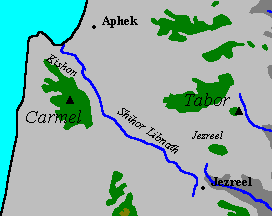|
July
15
|
Reading 1 - 1Samuel 29 & 30
Peter Cresswell
Peter Cresswell
29 v.6 - In saying that he had not found any evil in David Achish demonstrates the effectiveness of David [1 Samuel 27:10] in fighting against the Lord's enemies.
30
v.6 - In encouraging
himself in God David demonstrates how that it is possible at one time
to be unsure of the Lord's care and yet at another to trust wholly on
Him. The affliction of the situation in Ziklag forced David to trust his
God. May it be the chastening we receive of the Father's hand will force
us to place all our reliance on Him.
Peter Forbes
29:5 This is the third time that the Philistines have said this. The first was after the death of Goliath (1 Samuel 18:7) The second was when David had fled to Achish (1 Samuel 21:11) One wonders why David persisted in seeking to be with the Philistines against the background of their association of him with the death of Philistines.
30:1
Whilst the Philistines had given David Ziklag (1
Samuel 27:6) it seems that their 'generosity' stopped there. David
was off defending the Philistines - at least that is what they thought
- yet they did not seem to do anything to defend the city they had given
to David.
Peter Forbes
|
There are at least three cities called Aphek in the land of Israel. It would appear that the one mentioned here (:1) is the one shown on the map because of the mention of Jezreel and the fact that Saul went to Endor to see the woman with the familiar spirit and that Saul was in the area of Mount Gilboa. So when David went back to Ziklag (30:1) he travelled some distance. |
 |
30:23
In withstanding the men who would have taken the spoil to themselves we
see that David was a very different kind of man to Saul. Saul claimed
to 'fear the people' (1
Samuel 15:24) as a valid reason for not doing the right thing.
Peter Forbes
Reading 2 - Jeremiah 5
Peter Cresswell
Peter Cresswell
Peter Forbes
Peter Forbes
Peter Forbes
Reading 3 - Matthew 16
Peter Cresswell
Peter Forbes
Peter Forbes
Peter Forbes
WHO DO YOU SAY I AM?
Jesus
asked his disciples, "Who do people say the Son of Man is?" If he was
asking today we would probably get answers like: A prophet; A mythical
figure from Christian stories; Someone in the Bible; or, Don't know. Then
Jesus asked, "But who do you say I am?" This is a question we must all
ask ourselves every day of our lives. Peter's reply was the right one.
"You are the Christ (the Messiah), the Son of the Living God!" This was
just the answer Jesus wanted to hear and it was a great encouragement
to him to hear that at least one of his disciples understood who he was
and his mission. But who do we see Jesus as for us? Is he an amazing man
who changed the world? Is he someone to be worshipped in the Bible? Is
he the baby born in Bethlehem, crucified at Easter, who made his mark
on history? He is all of those things but he is much more than that too.
He is our personal living saviour, who saved us from our sins and who
came to save the world. He is the perfect son of God. And he is our reason
to live, our love, our life and our King who will return to reign in glory.
Who is he to you?
Robert
Prins
It happens with the best of intentions. We determine that the way we have planned the future is the best way, and with all our heart and soul we work towards its fulfillment. Our motivation could be anything from selfishness, economic, love, or even very noble spiritual reasons, that we choose to stand by a particular course of action. But the question we must ask ourselves is whether we are doing the will of God or not.
Peter found himself in just this situation when Jesus explained to his disciples that he was to go to Jerusalem to suffer, be killed and rise again on the third day. Peter did not think this was a good plan at all! Yet without this part of God's plan being fulfilled, no matter how much else Christ accomplished, all would have been lost. So Jesus said to Peter, "Get behind me, Satan! You are a stumbling block to me; you do not have in mind the things of God, but the things of men." (verse 23).
Let us make sure that we don't end up being a stumbling block to God's plan - no matter what our intentions. Rather we need to make sure we are working in accordance with the will of God.
Robert Prins
So how
did God reveal it to Peter? Was is a "bolt out of the blue"
experience? I don't think so, because if we look back over the previous
chapters in Matthew, we can see how the realisation was gradually dawning
on Peter. Every one of these realisations were after he had been tested
by God, humbled, and then saved by Jesus. (Luke
5v5-8; 8v25-27; 14v30-33) Notice how the words of Peter towards Jesus
grew in their understanding over time. This was the way that God revealed
Spiritual things to Peter, and the same way he reveals them to us. (Heb
12v10-11; Prov 3v11-13)
Robin
de Jongh